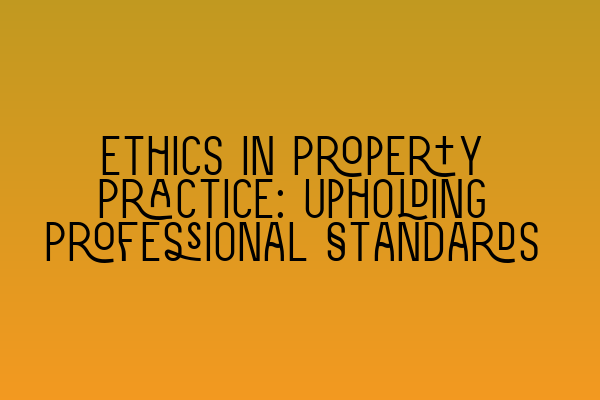Ethics in Property Practice: Upholding Professional Standards
Welcome to the blog of SQE Property Law & Land Law! In today’s post, we will be discussing the importance of ethics in property practice and the significance of upholding professional standards. Whether you are a solicitor, a property law student, or someone interested in the field, understanding these principles is essential to maintaining a high level of integrity and ensuring client trust.
Why Ethics Matter in Property Practice
Ethics play a crucial role in every aspect of property practice. As property solicitors, we are entrusted with clients’ financial interests, legal matters, and overall well-being. Upholding ethical standards helps maintain the integrity of the profession and ensures the delivery of quality service to our clients.
One of the key ethical considerations in property practice is maintaining confidentiality. Clients provide sensitive information that must remain confidential to protect their interests. Solicitors must adhere to strict confidentiality rules and only disclose information when authorized or required by law.
Another important ethical aspect is avoiding conflicts of interest. Property lawyers should not engage in activities that could compromise their professional judgment or loyalty to their clients. This includes not representing multiple parties in the same transaction without informed consent and avoiding personal or financial interests that may affect their obligation to act in the client’s best interests.
Integrity is the foundation of ethical property practice. Solicitors should always be truthful, honest, and transparent in their dealings with clients, colleagues, and the court. This includes accurately representing facts, providing realistic assessments, and avoiding any form of deception or misrepresentation.
By upholding ethical standards, property solicitors can establish themselves as trustworthy professionals, build strong client relationships, and contribute to a fair and just legal system.
Professional Standards in Property Practice
Professional standards are guidelines and rules that govern the conduct of property practitioners. These standards ensure a consistent and high level of professionalism in the field. As property solicitors, it is our responsibility to comply with these standards to fulfill our obligations to clients and society.
The Solicitors Regulation Authority (SRA) sets out the Code of Conduct, which outlines the professional standards for solicitors in England and Wales. The Code covers various areas, including client care, professional competence, integrity, and ethical behavior.
To maintain professional standards, property solicitors must keep their knowledge and skills up to date through continuous professional development (CPD). This includes attending relevant training courses, workshops, and seminars to enhance their expertise in property law and related areas.
Property practitioners should also follow best practices and guidelines provided by professional bodies and institutions, such as the Law Society and the Royal Institution of Chartered Surveyors (RICS). These organizations offer resources and support to help solicitors maintain high standards of practice and uphold the ethical principles of the profession.
The Role of Education and Training
Education and training play a vital role in ensuring property solicitors are equipped with the knowledge and skills necessary to uphold professional standards. The Solicitors Qualifying Examination (SQE) serves as a benchmark for assessing the competence of aspiring solicitors.
Preparation courses, such as the SQE 1 Preparation Courses and SQE 2 Preparation Courses, are available to help individuals develop a comprehensive understanding of property law and other areas covered in the SQE exams. These courses provide a structured learning environment and help candidates hone their skills and knowledge through practice exams and mocks.
Mock exams, like the SQE 1 Practice Mocks FLK1 FLK2, offer a valuable opportunity for candidates to familiarize themselves with the exam format and assess their readiness. Practice exam questions, such as those in the SQE 1 Practice Exam Questions, allow candidates to test their knowledge and identify areas for improvement.
Conclusion
Ethics and professional standards are the pillars of property practice. Upholding these principles ensures the delivery of quality service, maintains client trust, and promotes the integrity of the legal profession. As property solicitors, it is our duty to adhere to ethical guidelines, stay updated with professional standards, and continuously enhance our knowledge and skills through education and training.
Thank you for reading this blog post from SQE Property Law & Land Law. For more information on SQE exams and preparation, check out our related articles:
